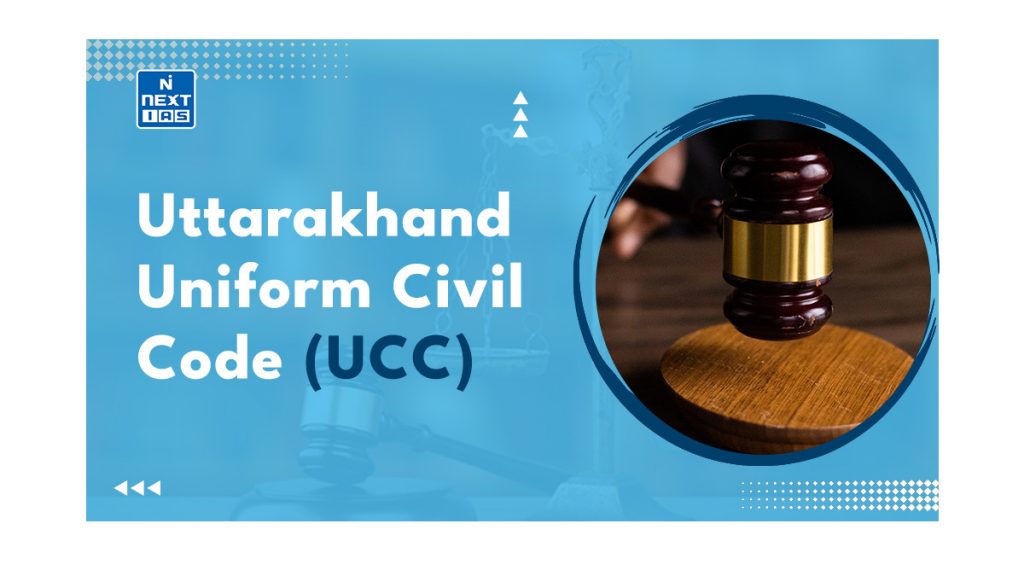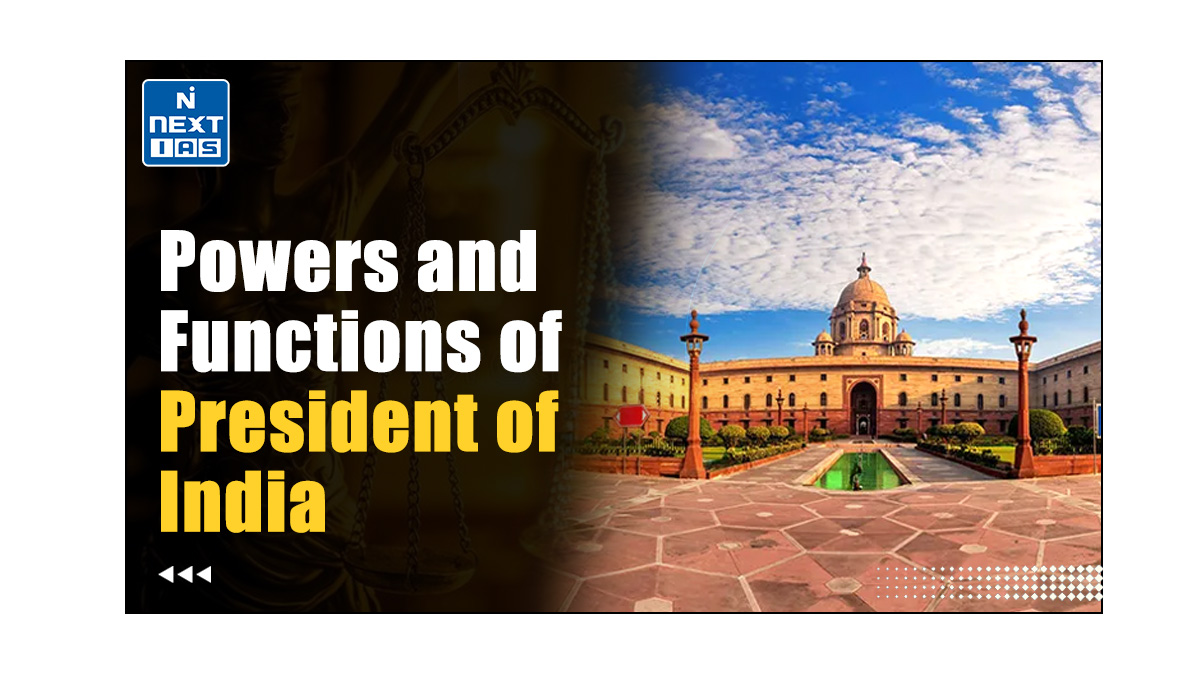
Over the years, the central government as well as some states have made certain efforts towards the implementation of the Uniform Civil Code (UCC). The recent passing of the Uttarakhand Uniform Civil Code Bill 2024 adds to the list of such efforts. As the bill continues to be debated and discussed across the country, this article of NEXT IAS aims to explain the key provisions of the Uttarakhand Uniform Civil Code Bill 2024, its historical background, benefits, challenges, and the concepts related to it.
About the Uttarakhand Uniform Civil Code (UCC) Bill 2024
Recently, the Uttarakhand Assembly passed the Uttarakhand Uniform Civil Code (UCC) Bill 2024, becoming the first state in independent India to implement the Uniform Civil Code. The bill so passed proposes common rules on marriage, divorce, inheritance of property, and live-in relationships for all residents of Uttarakhand (except Scheduled Tribes), regardless of their religion or faith.
This legislation of Uttarakhand stems from Article 44 (Directive Principles of State Policy) of the Constitution, which directs the state to endeavor to secure for the citizens a Uniform Civil Code throughout the territory of India.
| What is the Uniform Civil Code? – A Uniform Civil Code (UCC) refers to a common law for personal matters such as marriage, inheritance, divorce, adoption, etc that applies to all religious communities – It aims to replace the different personal laws that currently govern personal matters within different religious communities. – It aims to promote social harmony, gender equality, and secularism by eliminating disparate legal systems based on different religions and communities. – Such a code seeks to ensure uniformity of laws not only between the communities but also within a community. |
Read out detailed article on the Uniform Civil Code (UCC)
Development of Uttarakhand UCC Bill 2024
The Uttarakhand Government had been mulling a Uniform Civil Code for the state since long. Finally, the Uttarakhand Government announced the constitution of a five-member Expert Committee led by former Supreme Court Judge Justice Ranjana Prakash Desai to draft the Uniform Civil Code Bill. The other members of the committee were:
- Permod Kohli (Hon’ble Judge)
- Shri Shatrughna Singh (IAS)
- Shri Manu Gaur (Social Activist)
- Prof. Surekha Dangwal (Vice Chancellor, Doon University)
- Shri Ajay Mishra (Secretary, R.C, Uttarakhand).
After some deliberations and modifications, the draft was finalized and finally passed by the Uttarakhand Assembly recently.
Key Provisions of the Uttarakhand Uniform Civil Code Bill 2024
The key features of the Uttarakhand Uniform Civil Code Bill, 2024 are as follows:
Applicability
- It applies to all residents of Uttarakhand except the tribal community of the State.
- Section 2 of the Bill stipulates — “Nothing contained in this code shall apply to the members of any Scheduled Tribes within the meaning of clause (25) of Article 366 read with Article 142 of the Constitution of India and the persons and group of persons whose customary rights are protected under Part XXI of the Constitution of India.”
Marriage
- The bill mandates the compulsory registration of marriages within 60 days of solemnization. This provision applies to all residents of Uttarakhand, whether marrying within or outside the state.
- While non-registration of marriages won’t invalidate it, the parties concerned may face a penalty of Rs 10,000.
- Instances of furnishing false information intentionally would incur a fine of Rs 25,000 and a three-month jail term.
- No marriage can be dissolved without a court order otherwise it would attract imprisonment for up to 3 years.
Live-in Relationships
- Any live-in relationship within the state’s jurisdiction will have to be registered compulsorily, regardless of whether the concerned man and woman are residents of Uttarakhand or not.
- In case, couples in a live-in relationship do not submit their statement, they will be served a notice following which criminal prosecution can be initiated against them.
- Partners can terminate the relationship only by submitting a formal statement to the same effect.
- Women deserted by their live-in partners can claim maintenance through the competent court.
- Children born out of such relationships will be considered legitimate.
Queer Relationship
- The Bill leaves out the members of the LGBTQIA+ community from its ambit and applies only to heterosexual relationships.
- While it uses gender-neutral terms like “partners”, it defines a live-in relationship specifically as a “relationship between a man and a woman” who cohabit in a shared household through a relationship like marriage.
Prohibition of Bigamy or Polygamy
Section 4 of the bill states that none of the parties to a new marriage should have another spouse alive at the time of the marriage. Thus, it prohibits bigamy or polygamy.
Legal Recognition of Children
This Bill has abolished the concept of “illegitimate children”. The new law extends legal recognition to children born out of voidable marriages as well as live-in relationships.
Inheritance
- The Bill ensures equal property rights for sons and daughters, including illegitimate children, adopted children, and those born through surrogacy or assisted reproductive technology.
- It abolishes the coparcenary system governing ancestral property under the Hindu Succession Act of 1956.
- In cases of intestate succession, where no registered will exists, the Bill guarantees equal property rights for the spouse, children, and parents, departing from existing personal laws.
Criminalization of Some Marriage Practices
- This Bill has banned certain marriage practices prevalent among the Muslim community, such as nikah-halala and triple talaq, without mentioning their names.
- For example, according to Section 30(1) of the bill, individuals are now entitled to remarry their divorced spouse without any preconditions, thereby eliminating the practice of nikah-halala.
Divorce Proceedings
- Men and women have been accorded similar rights with respect to divorce.
- The grounds for divorce include adultery, cruelty, desertion, conversion to another religion, mental disorder, etc.
- It doesn’t recognize the “irretrievable breakdown of marriage”, which refers to a situation where the relationship between spouses has deteriorated to such an extent that it cannot be repaired or restored, leading to the irrelevance of continuing the marriage.
- Further, “voidable” marriages can be annulled on grounds such as non-consummation, contravention of marriage conditions etc.
- Women have special rights to seek divorce under the Bill only under two circumstances:
1. if the husband has been found guilty of rape or any kind of unnatural sexual offense,
2. if the husband has more than one wife - In case of divorce, the custody of a child up to 5 years of age remains with the mother. However, The Guardians and Wards Act of 1890 will continue to govern court-appointed guardianship.
Implications of the Uttarakhand UCC Bill 2024
The Uttarakhand Uniform Civil Code Bill, 2024, has attracted mixed reactions regarding its potential implications. Its potential impacts can be seen under the following two heads:
Potential Positive Implications
- Gender Equality – This bill could promote gender equality by eliminating discriminatory practices existing in some personal laws, specifically regarding inheritance and maintenance. It could also address discriminatory customs like polygamy.
- Simplification of Legal System – Streamlining personal laws across different communities might simplify the legal system, making it more efficient and accessible.
- National Integration – It could foster a sense of national unity by removing distinctions based on religious personal laws.
Potential Negative Implications
- Impact on Minority Communities – Critics fear the bill might disproportionately affect minority communities whose traditional practices and cultural identities might be disregarded. It could raise concerns about the preservation of unique customs and religious freedom.
- Constitutional Challenges – Some legal experts argue the bill might violate certain constitutional rights, particularly those related to religious freedom and equality before the law. This could lead to legal challenges and delays in implementation.
- Social Tensions – Implementing the bill could potentially escalate social tensions between different communities, especially if concerns about minority rights are not adequately addressed.
Concerns with Uttarakhand UCC Bill
Some sections of the society have raised the following concerns about the Uttarakhand Uniform Civil Code (UCC) Bill:
- Infringement of Right of Privacy – The provisions of mandatory registration of live-in relationships might infringe upon the right to privacy and the right to live with dignity guaranteed under Article 21.
- LGBTQIA+ Rights – The exclusion of queer relationships from the UCC highlights concerns about LGBTQIA+ rights and equality under the law. By specifically defining live-in relationships as being between a man and a woman, the UCC may perpetuate discrimination against LGBTQIA+ individuals and relationships.
- Non-inclusive – The exemption of tribal communities from the UCC raises questions about inclusivity and equal treatment under the law. While some argue that tribal communities should be allowed to maintain their customary practices, others question the fairness of applying different legal standards to different groups within the same communities.
- Surveillance Issues – The provisions of the Bill pertaining to surveillance could potentially be exploited to target and intimidate couples from different faiths or castes.
- Minority and Marginalized Women – Few provisions of the bill raise concerns about its potential impact on minority communities’ traditional practices and cultural identities and also affects women from marginalized communities who rely on customary support systems.
- Legal challenges – Some critics argue the bill might violate certain constitutional rights, specifically religious freedom and equality before the law. These concerns might lead to legal challenges in the future.
Way Forward
- Dialogue and Consultation: Consultation with all stakeholders, including religious communities, legal experts, and civil society organizations, could help understand and resolve concerns regarding the Bill.
- Public Education: Conducting public education campaigns to inform the public about the potential benefits of the Bill can help build consensus and garner support for its implementation.
- Inclusivity: The success of the Uttarakhand UCC will depend on its ability to strike a balance between promoting uniformity in personal laws and respecting the diverse cultural and religious identities of its pluralistic society.
- Monitoring and Evaluation: As and when the UCC is implemented, a mechanism should be established for monitoring its implementation, and evaluating its impact on society. This will help make necessary adjustments and smoothen the process of its implementation.
- Political Will: Political leaders must demonstrate leadership and a strong will to navigate through the complexities and challenges associated with the implementation of the bill.
The passage of the Uttarakhand Uniform Civil Code Bill marks a significant step towards realizing the long-standing aspiration of a Uniform Civil Code (UCC) in India. Despite some drawbacks and implementational challenges, the Bill has the potential to contribute to the state’s as well as India’s journey toward social justice, equality, and secularism. Due care should be taken to tackle the challenges coming in the way of its implementation.
GS - 2





